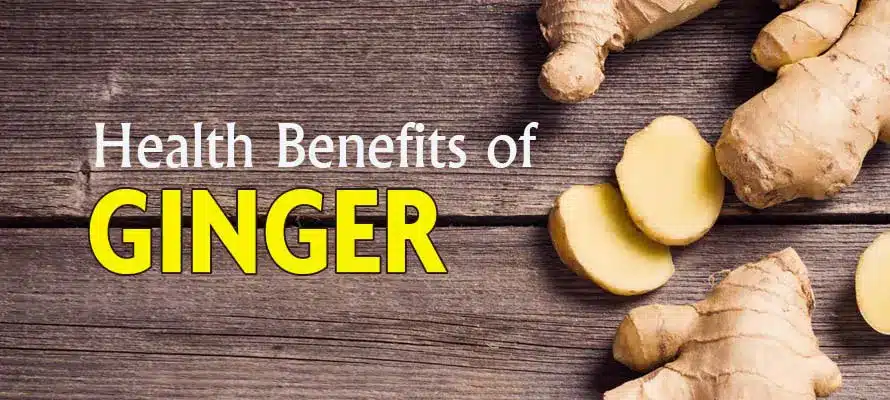Ginger Overview
If you’re someone that eats Asian or Indian cuisine, you likely enjoy the aromatic taste of ginger. It originates from Southeast Asia and is botanically a root. A member of a plant family that includes cardamom and turmeric.
It is typically grated, chopped or minced and added to various dishes. It is available in multiple forms including fresh, ginger paste and ginger powder[1].
It adds a sweet, somewhat spicy, peppery flavor and is frequently used in stir-fries, marinades, and sauces. It’s becoming a more mainstream ingredient, and for good reason.
It has been used for thousands of years in all types of cuisine. Some of its more notable health benefits include reducing gastrointestinal distress, alleviating morning sickness and relieving nausea.
In addition, it may have anti-inflammatory properties, making it an adjunct, alternative compound to use for pain management. New research[1] has even more exciting health benefits.
Health Benefits
1. Nausea and Morning Sickness
Ginger in the form of ginger tea, candied ginger or ginger lozenges and lollipops have been advised for pregnant women over time as a way to help with morning sickness.
Research suggests that it impacts neural receptors that trigger vomiting, which may help to reduce nausea[2].
Three compounds found in ginger that may boost its potent anti-nausea effect include 6-shogaol, 6-gingerol, and zingerone.
Scientists believe these elements inhibit serotonin 5-HT concentration- a receptor found in the gastrointestinal system that stimulates vagal nerve activity and induces nausea and vomiting.
It has been found to have therapeutic benefits to those undergoing chemotherapy that experience common side effects such as nausea and vomiting[2].
2. Digestion
It is believed to assist in food digestion in a number of ways. For starters, it helps with saliva production, which begins the breakdown of carbohydrates in the mouth through the enzyme salivary amylase.
It has also been found to increase production of trypsin, which helps protein digestion and pancreatic lipase, which helps digest fat[3].
In addition, it may stimulate the gastrointestinal tract, which helps to move food along the small and large intestine to prevent gas, bloating and constipation.
Individuals suffering IBS (irritable bowel syndrome) that often experience flatulence and bloating, may find some relief with ginger[3].
Ulcerative colitis is a chronic inflammatory bowel disease that is difficult to control and has a lifelong impact on individuals that suffer from it. A new 12-week, randomized control trial using ginger in patients with ulcerative colitis is being tested as well[4].
3. Diabetes Management
As the rate of diagnosis of diabetes increases globally, it’s important to find ways to improve blood sugar and reduce organ damage. Individuals with diabetes often suffer comorbid conditions related to oxidative stress (tissue damage) such as cardiovascular disease and kidney failure.
In a recent study on diabetic rats, researchers discovered a protective effect of ginger. Rats were given various doses of ginger extract had reductions in blood sugar, improvements in kidney function and reductions in hyperlipidemia[5].
Another study found that steamed ginger may have therapeutic effects on blood sugar. Researchers used steamed ginger extract and evaluated the pancreatic islet cells (the cells which secrete insulin) in mice.
The active components in ginger (gingerols, shogaols, and paradols) when steamed (known as GGO3) lower hyperglycemia in mice and was considered a safe functional food. [6] Trials in humans are advised to further the investigation.
4. Weight Control
It has been implicated in weight management as well, though more research is needed. The active compounds in ginger have been evaluated in a systematic review of 27 articles (17 animals, 6 in vitro, and 4 human studies).
The majority of studies found changes in weight in animal studies, but those in humans showed no changes or slight changes in weight and anthropometric measures in obese human subjects.
Scientists believe it may be beneficial in weight management through a few mechanisms. It increases thermogenesis, increases fat breakdown, inhibits fat absorption in the intestine, limits lipogenesis and helps with appetite control[7].
A more recent study review by Brazilian researchers evaluated the effects of ginger and avocado on weight management.
Their study indicated that ginger and avocado possess anti-inflammatory effects that stimulate enzymatic activity and alter obesity-related dysfunctions in the anti-inflammatory systems of different tissues without side effects.
In addition, compounds in ginger and avocado were found to reduce the negative effects of obesity on serum lipids[8].
5. Pain Relief
Delicious news for those with rheumatoid arthritis (RA), the chronic, autoimmune form of arthritis that impacts children as well as adults.
In a randomized double-blind placebo-controlled clinical control trial, 70 subjects with RA were randomized to receive a placebo or 1500 mg ginger powder for 12 weeks. Measures of immunity and inflammation were measured in each group.
After the intervention, a reduction in disease activity score was statistically significant in the ginger group[9].
It has also been found to have therapeutic value in reducing menstrual pain[10]. The anti-inflammatory compounds found in ginger may also offer some pain relief in dental patients.
In a small study of 60 subjects comparing it to Ibuprofen and placebo in patients undergoing molar extraction with post-surgical pain, scientists compared measures of inflammation including C-reactive protein, cheek swelling and mouth opening ability to score pain.
Measures for cheek swelling and reduction in mouth opening ability were similar in all three groups in the first five days.
No significant difference was observed between pain scores in the Ibuprofen and ginger groups, but ‘rescue medication’ was necessary on a surgical day in the placebo group.
Researchers concluded that it was as effective as Ibuprofen for pain reduction in post-op dental patients[11].
Safety and Side Effects
Studies have indicated it is safe to use for those suffering from OA (osteoarthritis) as well as diabetes and cardiovascular disease[12][13].
In addition, it appears to be safe to use for pregnant women suffering from morning sickness and nausea and vomiting. Adverse side effects such as spontaneous abortion or birth defects have not been observed in pregnant women. However, some individuals do experience heartburn and upset stomach with ginger[14].
As there are several preparations of ginger including fresh ginger, ginger powder, ginger tea, and candied ginger, it can be enjoyed in several ways.
However, high doses of ginger supplements should be avoided due to the risk of cardiac arrhythmias, depression of the central nervous system and heartburn[15]. Dietary supplements are not regulated by the FDA and should always be used with caution. Check with your doctor or pharmacist prior to use.
Frequently Asked Questions
Q: Can ginger burn belly fat?
A: While there are no magical foods to “burn belly fat”, a recent meta-analysis of 14 randomized control studies of 473 subjects found that supplemental ginger has a positive impact on body weight, waist to hip ratio, hip ratio, fasting blood sugar, and insulin resistance index. It also increases HDL (‘healthy’) cholesterol.[16]
As mentioned above, ginger may help with appetite control and thermogenesis (increased heat production in the body), which could help with fat loss[7].
Q: Can ginger be consumed daily?
A: Yes! Ginger prepared from ginger root, ginger paste, ginger powder, or ginger tea can be included as part of a healthy diet.
As mentioned above, supplemental ginger should not be taken in doses above the suggested amount as they may impact cardiac and nervous system function and increase the risk for heartburn[15].
Q: Who should not take ginger?
A: Ginger could reduce nausea and vomiting in some pregnant women. But pregnant women should be careful with ginger it may cause miscarriage.
16 Sources
Health Insiders uses only high-quality sources, including peer-reviewed studies, to support the facts within our articles. Read our editorial policy to learn more about how we fact-check and keep our content accurate, reliable, and trustworthy.
[1] Jiang TA. Health Benefits of Culinary Herbs and Spices. J AOAC Int. 2019 Mar 1;102(2):395-411. doi: 10.5740/jaoacint.18-0418. Epub 2019 Jan 16. PMID: 30651162.
[2] Lete I, Allué J. The Effectiveness of Ginger in the Prevention of Nausea and Vomiting during Pregnancy and Chemotherapy. Integr Med Insights. 2016;11:11-17. Published 2016 Mar 31. doi:10.4137/IMI.S36273
[3] Peterson CT, Rodionov DA, Iablokov SN, Pung MA, Chopra D, Mills PJ, Peterson SN. Prebiotic Potential of Culinary Spices Used to Support Digestion and Bioabsorption. Evid Based Complement Alternat Med. 2019 Jun 2;2019:8973704. doi: 10.1155/2019/8973704. PMID: 31281405; PMCID: PMC6590564.
[4] Shayesteh F, Haidari F, Shayesteh AA, Mohammadi-Asl J, Ahmadi-Angali K. Ginger in patients with active ulcerative colitis: a study protocol for a randomized controlled trial. Trials. 2020 Mar 18;21(1):278. doi: 10.1186/s13063-020-4193-7. PMID: 32183895; PMCID: PMC7079449.
[5] Al Hroob AM, Abukhalil MH, Alghonmeen RD, Mahmoud AM. Ginger alleviates hyperglycemia-induced oxidative stress, inflammation and apoptosis and protects rats against diabetic nephropathy. Biomed Pharmacother. 2018 Oct;106:381-389. doi: 10.1016/j.biopha.2018.06.148. Epub 2018 Jul 11. PMID: 29966984.
[6] Nam YH, Hong BN, Rodriguez I, Park MS, Jeong SY, Lee YG, Shim JH, Yasmin T, Kim NW, Koo YT, Lee SH, Paik DH, Jeong YJ, Jeon H, Kang SC, Baek NI, Kang TH. Steamed Ginger May Enhance Insulin Secretion through KATP Channel Closure in Pancreatic β-Cells Potentially by Increasing 1-Dehydro-6-Gingerdione Content. Nutrients. 2020 Jan 26;12(2):324. doi: 10.3390/nu12020324. PMID: 31991895; PMCID: PMC7071297.
[7] Ebrahimzadeh Attari V, Malek Mahdavi A, Javadivala Z, Mahluji S, Zununi Vahed S, Ostadrahimi A. A systematic review of the anti-obesity and weight lowering effect of ginger (Zingiber officinale Roscoe) and its mechanisms of action. Phytother Res. 2018 Apr;32(4):577-585. doi: 10.1002/ptr.5986. Epub 2017 Nov 29. PMID: 29193411.
[8] Tramontin NDS, Luciano TF, Marques SO, de Souza CT, Muller AP. Ginger and avocado as nutraceuticals for obesity and its comorbidities. Phytother Res. 2020 Jun;34(6):1282-1290. doi: 10.1002/ptr.6619. Epub 2020 Jan 27. PMID: 31989713.
[9] Aryaeian N, Shahram F, Mahmoudi M, Tavakoli H, Yousefi B, Arablou T, Jafari Karegar S. The effect of ginger supplementation on some immunity and inflammation intermediate genes expression in patients with active Rheumatoid Arthritis. Gene. 2019 May 25;698:179-185. doi: 10.1016/j.gene.2019.01.048. Epub 2019 Mar 4. PMID: 30844477.
[10] Shirvani MA, Motahari-Tabari N, Alipour A. The effect of mefenamic acid and ginger on pain relief in primary dysmenorrhea: a randomized clinical trial. Arch Gynecol Obstet. 2015 Jun;291(6):1277-81.
[11] Rayati F, Hajmanouchehri F, Najafi E. Comparison of anti-inflammatory and analgesic effects of Ginger powder and Ibuprofen in postsurgical pain model: A randomized, double-blind, case-control clinical trial. Dent Res J (Isfahan). 2017 Jan-Feb;14(1):1-7. doi: 10.4103/1735-3327.201135. PMID: 28348610; PMCID: PMC5356382..
[12] Bartels EM, Folmer VN, Bliddal H, Altman RD, Juhl C, Tarp S, Zhang W, Christensen R. Efficacy and safety of ginger in osteoarthritis patients: a meta-analysis of randomized placebo-controlled trials. Osteoarthritis Cartilage. 2015 Jan;23(1):13-21. doi: 10.1016/j.joca.2014.09.024. Epub 2014 Oct 7. PMID: 25300574.
[13] Rahimlou M, Yari Z, Rayyani E, Keshavarz SA, Hosseini S, Morshedzadeh N, Hekmatdoost A. Effects of ginger supplementation on anthropometric, glycemic and metabolic parameters in subjects with metabolic syndrome: A randomized, double-blind, placebo-controlled study. J Diabetes Metab Disord. 2019 Mar 22;18(1):119-125. doi: 10.1007/s40200-019-00397-z. PMID: 31275882; PMCID: PMC6582048.
[14] Viljoen E, Visser J, Koen N, Musekiwa A. A systematic review and meta-analysis of the effect and safety of ginger in the treatment of pregnancy-associated nausea and vomiting. Nutr J. 2014 Mar 19;13:20. doi: 10.1186/1475-2891-13-20. PMID: 24642205; PMCID: PMC3995184.
[15] https://www.rxlist.com/consumer_ginger_african_ginger/drugs-condition.htm
[16] Maharlouei N, Tabrizi R, Lankarani KB, Rezaianzadeh A, Akbari M, Kolahdooz F, Rahimi M, Keneshlou F, Asemi Z. The effects of ginger intake on weight loss and metabolic profiles among overweight and obese subjects: A systematic review and meta-analysis of randomized controlled trials. Crit Rev Food Sci Nutr. 2019;59(11):1753-1766. doi: 10.1080/10408398.2018.1427044. Epub 2018 Feb 2. PMID: 29393665.


 This article changed my life!
This article changed my life!
 This article was informative.
This article was informative.
 I have a medical question.
I have a medical question.
 Ask a Question
Ask a Question

 This article contains incorrect information.
This article contains incorrect information.
 This article doesn’t have the information I’m looking for.
This article doesn’t have the information I’m looking for.